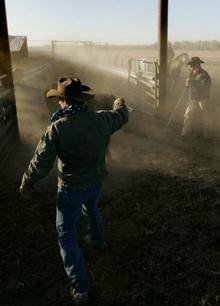courtesy of Tom Giessel

To Abandon Our Farms?
Our good friend, J.D. Stols of Beattie, Kansas, sends us a clipping from a St. Joseph newspaper which throws some light on a situation which is confronting us as a nation of farmers and business men. “This article hits the nail on the head,” writes Mr. Stosz. “Just as Brother John Frost stated in last week’s Tax Relief Department article, at the present time the farmer pays taxes on his capital whether he receives an income or not.”
The clipping, which is dated at Urbana, Ill., and sent out by the United Press, follows:

A nation of abandoned farms with farm owners driven into tenantry unless the United States develops a healthier attitude towards agriculture was predicted today by Eugene Davenport, International far authority,, in an interview with the United Press.
Davenport, for twenty-seven years dean of the college of agriculture, University of Illinois, and former president of the college of agriculture at Sao Paulo, Brazil, declared no class of business is as sorely affected as farming. Furthermore, he said, agriculture is less able to take care of itself during boom times than any other business.
“Farming is a private business but agriculture is a national enterprise,” Davenport said, “because the farmer produces the food of all people and because he is in possession of the national estate.
“It is bad for society when any class is crowded to the wall, but it is doubly sad when that happens to the farming class. The first thing a farmer does is deny himself and his family everything except the bare necessities. That virtually removes some 6,000,000 families from the market and that is about where they are now.
“If the farmer permits his buildings and land to deteriorate he is depleting the national wealth as well as his own.”
There are several reasons, Davenport said, why the farmer cannot care for his interests efficiently in boom times “unless it be in the early days of a great war when food prices are abnormally high.”
“First of all,”, he said, “is the fact that food consumption is limited not only by the family income but by the capacity of the human stomach. This latter stubborn fact fixes an unpassable maximum to the price level of farm commodities outside of textiles.
“But the minimum may go much lower, for every food fad and very fashion that demands the slender figure reduces the farmer’s market. More persons than we realize are now living on half rations or even less. Hence the so-called surplus.
“The farmer’s great handicaps now are increased by the fact that he pays taxes on his capital whether he enjoys an income or not. The state is finding a surprising amount of land on its hands through delinquent taxes. Once off the land, how will society get the farmer back onto the public domain? And what will the state do with the land if it doesn’t get him back?












